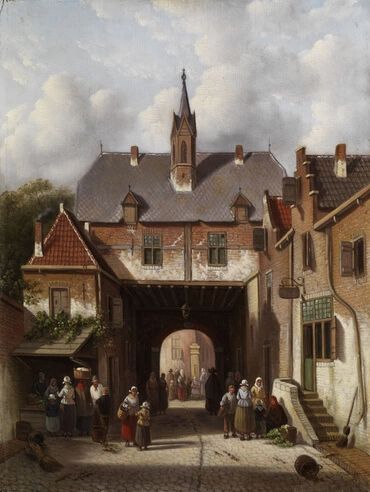Gate

Gates" in ancient times had a significance that does not hold in the modern world. Cities then were enclosed by walls for protection; gates in the walls let people in and out to do their business, but were also the weak points in the cities' defenses. In the Bible, cities on one level represent the minds of individual people. On a broader level, they represent beliefs shared by a community. The gates, then, represent openings where the Lord can feed us an understanding of truth and a desire for good. They also represent points where the hells can invade and sway us with false ideas and evil desires. We are kept in balance during our lifetimes, with influences from both the Lord and from hell. Ideally, we will over our lifetimes continue to invite the Lord farther and farther in and drive the hells back until ultimately the Lord can occupy our minds completely. And that point our belief in Him and His power and love will hold the gates and deny evil any entrance. As individuals, we at that point become angels. As communities, we at that point become part of the Lord's church. And at that point the gates become an entry point, introductory truths that allow people to enter churches and start bringing the Lord into their lives.
Apocalypse Explained # 1037
1037. Verse 3. And he carried me away in the spirit into a wilderness, signifies into a place appearing in vision that corresponded to the state of that religious persuasion. This is evident from the signification of "wilderness," as being a state of the church in which there is no longer any good or truth (See n. 730). But as a church in which there is no longer any good or truth is not a church, it is called a religious persuasion. Also from the signification of "in the spirit," as being in vision, for what John saw in the spirit he saw in vision. To see in vision is to see such things as exist with angels in heaven, which are representative and thus significative of things spiritual. When these appear to man they do not appear before the sight of his body, but before the sight of his spirit. For the spirit of man has eyes as well as his body; but the eyes of his spirit see the things that are in the spiritual world, because all things that appear there are from a spiritual origin, and the spiritual man sees spiritual things with the understanding, and with the eyes he sees the same in a form like the natural. But the eyes of the body see the things that are in the material world, because all things that appear there are from a natural origin; and with his understanding the material man sees natural things, while with his eyes he sees the same in a material form. So when the eyes of the spirit were opened with the prophets they saw such things as represented and thus signified the celestial Divine and spiritual Divine things of the church, and sometimes such things as represented and thus signified things that were to come to pass in the churches in the future; and such were the things that John saw. He now saw a wilderness, because a "wilderness" signifies a state of the church devastated of all good and truth; and this state corresponds to the church that had become Babylon. This is why Babylon is described in many passages of the Word as a wilderness, as in the following:
Art thou he that hath made the world a wilderness, and destroyed the cities thereof? (Isaiah 14:17).
Babylon shall be as God's overthrowing Sodom and Gomorrah; it shall not be inhabited forever; it shall not be dwelt in even from generation to generation; that the Arabian may not abide there. The daughters of the owl shall dwell there, and the satyrs shall dance there (Isaiah 13:19-22; also Jeremiah 50:37-40; 51:2, 25-26, 37, 41-43).






